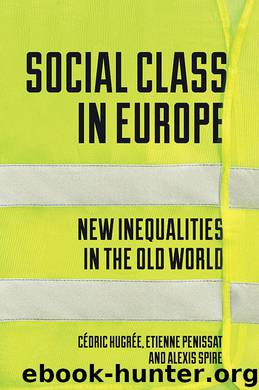Social Class in Europe by Etienne Penissat & Alexis Spire

Author:Etienne Penissat & Alexis Spire
Language: eng
Format: epub
Publisher: Verso Books
AT THE BOTTOM OF THE EUROPEAN SOCIAL SPACE
Over the last thirty years, the economic and social equilibriums that previously held sway in Europe have been progressively modified as the EU expanded to include new member states. Historically, there was a structural divide between the rich nations of the North, including those that initiated the European project, and those of the South, which were brought in more recently. Since the entry of the former countries of the East into the European Union, this structural opposition has been overturned. It is now the working class in the eastern part of the continent which forms the base of the European social space, albeit with internal variations: Hungary, Poland and the Czech Republic have seen strong economic development, while Bulgaria and Romania are still characterised by great poverty. For their part, the workers in the countries of the South, such as Portugal and Greece, are on a socio-economic level substantially higher than that of their peers in Central and Eastern Europe, but bear the full force of the austerity policies that Brussels enforces as a condition of their staying in the European Union.
The working class of the East and South: the dogsbodies of Europe
In many respects, the working class in the countries of the East and South occupies the lowest position in the European social space, and shows signs of great financial poverty, combined with working conditions that are harsher than anywhere else.2 Moreover, the statistical surveys available relate only to people in employment, resulting in an underestimate of the difficulties encountered by the most marginalised groups, particularly those who make their living from the ‘informal’ economy.
This highly disadvantaged position in the job market is due in large part to the social shifts that have taken place in these countries in the last twenty years. In Romania, one of the most economically disadvantaged countries, the number of industrial jobs fell from 4.7 million in 1990 to 1.7 million in 2012. Redundancies in industrial and mining regions have forced many workers to return to the rural regions they came from, where they live at barely more than subsistence level. In the Jiu valley, restructuring in the mines has definitively broken the power of the miners, who formed the working-class aristocracy prior to the fall of Ceauşescu. This forced-march transition of the former industrial regions has resulted in deteriorating living standards and the destabilisation of home and family. While some emigrate – initially to Hungarian mines, later to other EU member countries following the 2007 enlargement – or start their own businesses, there are many former miners who are isolated in their homes. Through the drastic reduction in jobs resulting from voluntary redundancies, places of male sociality have become deserted, and local and family solidarities dislocated. The reduction in the status of workers has eroded the system of values associated with the mine, which extolled class loyalty and physical labour. The wives of ex-miners have been forced to look for work, usually of a highly precarious
Download
This site does not store any files on its server. We only index and link to content provided by other sites. Please contact the content providers to delete copyright contents if any and email us, we'll remove relevant links or contents immediately.
| Anthropology | Archaeology |
| Philosophy | Politics & Government |
| Social Sciences | Sociology |
| Women's Studies |
Good Economics for Hard Times by Abhijit V. Banerjee & Esther Duflo(884)
The Spirit Level: Why Greater Equality Makes Societies Stronger by Richard Wilkinson & Kate Pickett(880)
Villains of All Nations by Marcus Rediker(739)
The Address Book by Deirdre Mask(738)
The Millionaire Next Door by Thomas Stanley & William Danko(727)
The Price of Inequality by Joseph E. Stiglitz(705)
The Address Book: What Street Addresses Reveal About Identity, Race, Wealth, and Power by Deirdre Mask(665)
Good Economics for Hard Times by Abhijit V. Banerjee(632)
Age of Capital 1848-1875 by Eric Hobsbawm(609)
The Great Inequality by Yates Michael D(599)
Classic Writings in Anarchist Criminology by Anthony J. Nocella II(588)
Very Important People by Ashley Mears(585)
Home by eoin(564)
Gilded Lives, Fatal Voyage: The Titanic's First-Class Passengers and Their World by Hugh Brewster(542)
Plutocrats: The Rise of the New Global Super-Rich and the Fall of Everyone Else by Chrystia Freeland(527)
The Hidden History of Monopolies by Thom Hartmann(513)
The Code of Capital by Katharina Pistor(512)
The Privileged Poor by Jack Anthony Abraham(511)
Conscientious Objections by Neil Postman(494)
